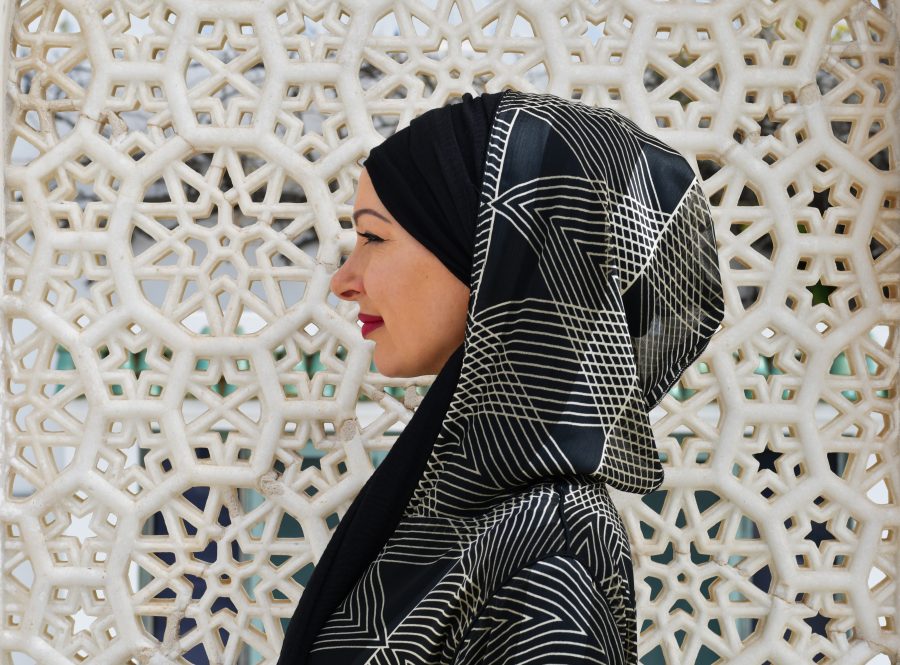Through the art of hip-hop, Amirah Sackett challenges heavy stereotypes commonly associated with American Muslims.
With Sackett’s dance group, “We’re Muslim, Don’t Panic” (WMDP), she has translated her talent as a dancer into a socially conscious message about identity, particularly her own identity as a Muslim woman.
Despite originally being trained in ballet, Sackett’s love of hip-hop and ability to use hip-hop as a mechanism of social change has led her to perform primarily as a hip-hop dancer, though her musical interests and dancing abilities are manifold.
“There’s so much freedom in what you do [with hip-hop],” she said in her talk on Wednesday. “You learn the foundations but then you add your own style. That’s the beautiful thing about hip-hop and why I love the community in Chicago—no one cares if you’re Muslim or a woman. If you dance and get down and are respectful, they respect you.”
This attitude does not necessarily extend to every other aspect of American culture and a particular focus of Sackett’s talk was on mutual understanding and mutual respect. As a Muslim woman, she was suited to the task of bridging this gap, particularly between American women and women in the middle east.
“Having multiple identities gives you a gift, the gift to bridge,” she said.
“The western woman looks at [Muslim] women saying, ‘Oh you’re all covered up, men are probably making you do that, it’s hot, you’re oppressed,” she said. “Muslim women look at Western women, [and see that] you’re in bikinis, you’re objectified by men, no one values you, you’re oppressed.”
At the heart of the issue, Sackett said, is bodily autonomy; that is, the ability for women to control how they dress and how they are viewed.
“Women have power in wearing what they want,” she said. “But I also understand the beauty of covering up. Then all you have to notice is what I’m saying, and not how many cheeseburgers I had yesterday. I’m not letting you control how you see me, I’m controlling that.”
One way in which Sackett deconstructs this Muslim-American dichotomy is in her dress, by integrating elements of both Muslim culture and American hip-hop culture into her outfits for her videos.
“I started to play with the imagery of using both my Muslim identity and hip-hop culture in the way that I dress,” she said. “It was taking the image that people use to say that we’re oppressed and making it look beautiful and modern.”
“It made some Muslims mad, and some non-Muslims, too,” she added. “I don’t think you’re really doing anything unless someone’s pissed.”
This isn’t the only way in which her hip-hop style and her Muslim identity merge, as she explains, “It’s interesting that I gravitated towards this dance form, as a lot of Islamic art is based on geometry.”
This is a reference to the patterned, rigid and almost kaleidoscopic appearance that many of her dance routines take on.
Her performance on Thursday was a solo piece titled, “Love Embraces All,” with an original sound design by Chicago DJ Nevin Hersch. Much of Sackett’s inspiration comes from the 13th Century poet Rumi, a Sufi Muslim, and her performance will feature his work as interpreted by Aja Black.
This performance will be a testament to love and understanding, both as an introspective experience for Sackett and as a broader cultural message that she expresses through her artform.
“Whatever skills you have, whatever platform you’ve been given, whatever creativity you have, you need to use that to make change,” she said. “Using your own voice, using your art, using whatever platform you have to share your own voice, your own story.”
Since Sackett performed on Thursday, The Lafayette was unable to report on the performance due to our deadline on Wednesdays nights.

























































































































